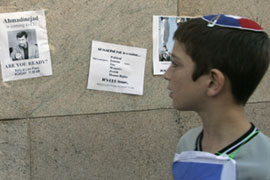Iran ‘not headed for war with US’
President says Iran has no need for nuclear arms as protests greet his New York visit.

Published On 24 Sep 2007
In the interview with CBS’s 60 Minutes, recorded on Thursday and to be aired on Sunday, Ahmadinejad said: “Our plan and programme is very transparent.
|
“The countries that feel threatened … should prepare for defence, and even counterattack” Adolfo Talpalar, Stockholm, Sweden |
“In political relations right now, the nuclear bomb is of no use. If it was useful, it would have prevented the downfall of the Soviet Union. If it was useful, it would resolve the problem the Americans have in Iraq.”
Washington accuses Tehran of seeking to develop nuclear weapons but Iran says the programme is simply to produce electricity.
Last week, ahead of a meeting of the permanent members of the UN Security Council which discussed new sanctions against Iran, France’s foreign minister urged the world to prepare for war with Iran over its refusal to halt uranium enrichment.
‘Platform for hate’
Protests against Ahmadinejad’s visit to New York began even before the Iranian president had landed.
A group of about 40 elected officials and civic leaders gathered on Sunday outside Columbia University, where Ahmadinejad was scheduled to speak on Monday.
Some carried placards with slogans such as “Don’t give a platform to hate” and “Go to hell” while denouncing Ahmadinejad as a “Hitler wannabe” and a Holocaust denier.
“There is no excuse to invite this madman, this little Hitler,” Dov Hikind, a New York state assemblyman, said.
“This is immoral. This is outrageous. This is sick,” he said. “Do we have to invite him into our community? … There is absolutely no justification.”
 |
| Columbia University said Ahmadinejad would be challenged on his Holocaust views [AFP] |
David Weprin, a city council member, said: “This invitation is a slap in the face to all New Yorkers and especially to those families who lost loved ones on September 11 right here in New York City.”
But Lee Bollinger, Columbia’s president, defended the university’s decision to invite Ahmadinejad, saying that Columbia “as a community dedicated to learning and scholarship, is committed to confronting ideas”.
Bollinger said he would introduce the event and challenge Ahmadinejad’s comments on the Holocaust, his calls for the destruction of Israel and Tehran’s pursuit of a nuclear programme in the face of international opposition.
Last year, Columbia cancelled a planned appearance by Ahmadinejad citing security and logistical reasons.
‘Different opinions’
On Sunday, Ahmadinejad said that the American people were eager to hear different opinions about the world, and he was looking forward to having the chance to voice them during his trip to the United States, according to Iran’s state news agency.
| “This invitation is a slap in the face to all New Yorkers and especially to those families who lost loved ones on September 11 right here in New York City” David Weprin, New York city council member |
“The United States is a big and important country with a population of 300 million.
Due to certain issues, the American people in the past years have been denied correct and clear information about global developments and are eager to hear different opinions,” he was quoted as saying.
On Tuesday, the Iranian president will address the UN General Assembly, which he described before leaving Tehran as an “important podium” to express Iran’s views on regional and global issues.
Last week, New York police said that the Iranian president had been denied his request to lay a wreath at the World Trade Centre site where the September 11 attacks in New York occurred.
In the 60 Minutes interview Ahmadinejad indicated he would not press the issue but expressed disbelief that the visit to ground zero would offend Americans.
The US and Iran have not had formal diplomatic relations since revolutionary students stormed the US embassy in Tehran after the country’s Islamic Revolution in 1979.
Source: News Agencies